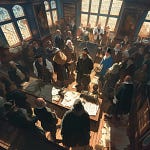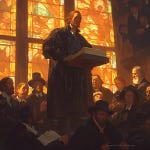Democracy as Detrimental to Church and State, Illuminated Governance, Essential, Interconnected.
“The last form of democracy, that in which all share alike, is one which cannot be borne by all states, and will not last long unless well regulated by laws and customs. The more general causes which tend to destroy this or other kinds of government have been pretty fully considered. In order to constitute such a democracy and strengthen the people, the leaders have been in the habit including as many as they can, and making citizens not only of those who are legitimate, but even of the illegitimate, and of those who have only one parent a citizen, whether father or mother; for nothing of this sort comes amiss to such a democracy. This is the way in which demagogues proceed. Whereas the right thing would be to make no more additions when the number of the commonalty exceeds that of the notables and of the middle class beyond this not to go. When in excess of this point, the constitution becomes disorderly, and the notables grow excited and impatient of the democracy, as in the insurrection at Cyrene; for no notice is taken of a little evil, but when it increases it strikes the eye. Measures like those which Cleisthenes passed when he wanted to increase the power of the democracy at Athens, or such as were taken by the founders of popular government at Cyrene, are useful in the extreme form of democracy. Fresh tribes and brotherhoods should be established; the private rites of families should be restricted and converted into public ones; in short, every contrivance should be adopted which will mingle the citizens with one another and get rid of old connections. Again, the measures which are taken by tyrants appear all of them to be democratic; such, for instance, as the license permitted to slaves (which may be to a certain extent advantageous) and also that of women and children, and the allowing everybody to live as he likes. Such a government will have many supporters, for most persons would rather live in a disorderly than in a sober manner.”
~ Aristotle; Politics, book VI, section 4, (circa ~350 BCE)
Addendum: James E. Wood Jr. examines The Relationship of Religious Liberty to Civil Liberty and a Democratic State. This excellent supplement counterpoints much of what was covered & analyzed in today’s episode.
Happy Reading!
Your support is vital for this Mammoth undertaking & endeavour!
If this project interests you, I would greatly appreciate it if you subscribed to a Monthly/Yearly pledge to support my work so that I can provide you, Dear Listeners, with Top-quality material.
Come & join me to explore & study US History as it ought to be: in the words of the peoples of the time themselves!
Alternatively, you can tip here:
Thank You, Dear Listeners, for all your support!
















Share this post